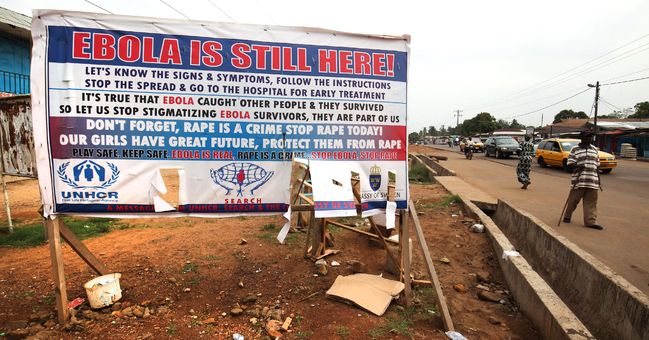Aid programme against Ebola
Reinforce health systems in Africa
"Ebola has not yet been conquered". This is what the Minister of Health, Hermann Gröhe, said before departure to West Africa. He is visiting the region most affected by Ebola, together with the Federal Development Minister, Gerd Müller. A further 200 million EUR is to be used for a special aid programme.
 Those countries affected by Ebola still rely on aid.
Source: picture alliance / dpa /AHMED JALLANZO
Those countries affected by Ebola still rely on aid.
Source: picture alliance / dpa /AHMED JALLANZO
Using this special aid programme, Germany wants to promote health systems and a better crisis response in Africa. Federal Development Minister, Gerd Müller, gave his assurance of this in a newspaper interview.
Müller left for a four-day trip to Ghana and Liberia, together with the Federal Minister of Health, Hermann Gröhe. While there, both ministers want to gain information about the reconstruction of those countries which were particularly affected by Ebola. Müller and Gröhe are being accompanied by the German government's Ebola Commissioner, Walter Lindner, along with a delegation of national and international experts.
Initial successes have been achieved
The international community has set itself a new and complex challenge in the fight against Ebola. Significant successes have been achieved throughout the course of this. The number of cases is continually and consistently declining. The most important challenge is now the transition from humanitarian emergency aid to reconstruction and long-term stabilisation of the affected countries.
By the end of March 2015, around 25,200 diagnosed cases of illness were reported to the World Health Organization. Approximately 10,460 infected people had died by that time. There is reason to fear that the actual number of cases of illness is much higher, however.
Up to now, Germany provided financial assistance of around 195 million EUR to combat Ebola. Logistical support is on top of this. The Federal Armed Forces have transported approximately 700 tonnes of aid items to the affected countries. The Technische Hilfswerk took care of water provision in the treatment centres in Sierra Leone. In addition, many volunteers are and have been providing assistance. The Deutsches Rotes Kreuz was responsible for their training.
German aid geared to the long-term
The Federal government will continue its involvement. Germany is one of the few bilateral providers present in all three of the countries most affected by the crisis. The development cooperation from 165 local forces in all three countries will continue. Investments and fast-acting measures in the sectors for health, food security, education and infrastructure are in addition to this.
Germany is advancing the further development of European and international cooperation. In order to be able to intervene worldwide more quickly in future, a core team of white helmets is to be set up with the Deutsche Gesellschaft für Internationale Zusammenarbeit, consisting of mobile teams of doctors, technicians and specialists, Federal Development Minister Müller announced.
Tuesday, 07 April 2015

